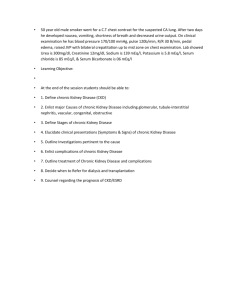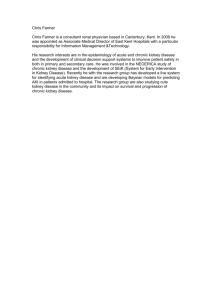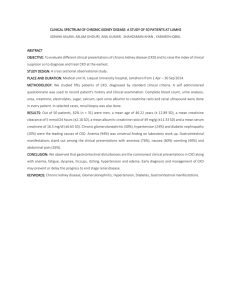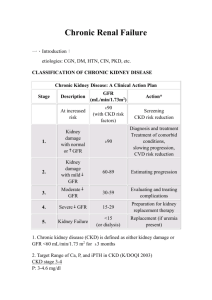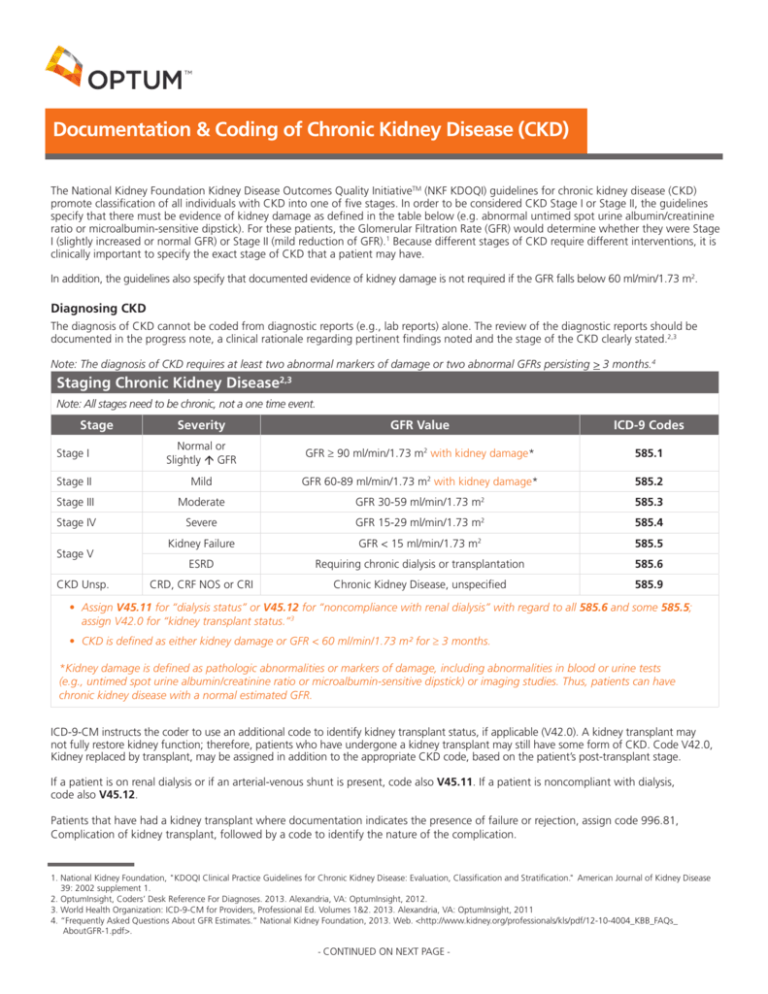
Documentation & Coding of Chronic Kidney Disease (CKD)
The National Kidney Foundation Kidney Disease Outcomes Quality InitiativeTM (NKF KDOQI) guidelines for chronic kidney disease (CKD)
promote classification of all individuals with CKD into one of five stages. In order to be considered CKD Stage I or Stage II, the guidelines
specify that there must be evidence of kidney damage as defined in the table below (e.g. abnormal untimed spot urine albumin/creatinine
ratio or microalbumin-sensitive dipstick). For these patients, the Glomerular Filtration Rate (GFR) would determine whether they were Stage
I (slightly increased or normal GFR) or Stage II (mild reduction of GFR).1 Because different stages of CKD require different interventions, it is
clinically important to specify the exact stage of CKD that a patient may have.
In addition, the guidelines also specify that documented evidence of kidney damage is not required if the GFR falls below 60 ml/min/1.73 m2.
Diagnosing CKD
The diagnosis of CKD cannot be coded from diagnostic reports (e.g., lab reports) alone. The review of the diagnostic reports should be
documented in the progress note, a clinical rationale regarding pertinent findings noted and the stage of the CKD clearly stated.2,3
Note: The diagnosis of CKD requires at least two abnormal markers of damage or two abnormal GFRs persisting > 3 months.4
Staging Chronic Kidney Disease2,3
Note: All stages need to be chronic, not a one time event.
Stage
Severity
GFR Value
ICD-9 Codes
Stage I
Normal or
Slightly á GFR
GFR ≥ 90 ml/min/1.73 m2 with kidney damage*
585.1
Stage II
Mild
GFR 60-89 ml/min/1.73 m2 with kidney damage*
585.2
Stage III
Moderate
GFR 30-59 ml/min/1.73 m2
585.3
Stage IV
Severe
GFR 15-29 ml/min/1.73 m2
585.4
Kidney Failure
GFR < 15 ml/min/1.73 m2
585.5
ESRD
Requiring chronic dialysis or transplantation
585.6
CRD, CRF NOS or CRI
Chronic Kidney Disease, unspecified
585.9
Stage V
CKD Unsp.
• Assign V45.11 for “dialysis status” or V45.12 for “noncompliance with renal dialysis” with regard to all 585.6 and some 585.5;
assign V42.0 for “kidney transplant status.”3
• CKD is defined as either kidney damage or GFR < 60 ml/min/1.73 m² for ≥ 3 months.
*Kidney damage is defined as pathologic abnormalities or markers of damage, including abnormalities in blood or urine tests
(e.g., untimed spot urine albumin/creatinine ratio or microalbumin-sensitive dipstick) or imaging studies. Thus, patients can have
chronic kidney disease with a normal estimated GFR.
ICD-9-CM instructs the coder to use an additional code to identify kidney transplant status, if applicable (V42.0). A kidney transplant may
not fully restore kidney function; therefore, patients who have undergone a kidney transplant may still have some form of CKD. Code V42.0,
Kidney replaced by transplant, may be assigned in addition to the appropriate CKD code, based on the patient’s post-transplant stage.
If a patient is on renal dialysis or if an arterial-venous shunt is present, code also V45.11. If a patient is noncompliant with dialysis,
code also V45.12.
Patients that have had a kidney transplant where documentation indicates the presence of failure or rejection, assign code 996.81,
Complication of kidney transplant, followed by a code to identify the nature of the complication.
1. National Kidney Foundation, "KDOQI Clinical Practice Guidelines for Chronic Kidney Disease: Evaluation, Classification and Stratification." American Journal of Kidney Disease
39: 2002 supplement 1.
2. OptumInsight, Coders’ Desk Reference For Diagnoses. 2013. Alexandria, VA: OptumInsight, 2012.
3. World Health Organization: ICD-9-CM for Providers, Professional Ed. Volumes 1&2. 2013. Alexandria, VA: OptumInsight, 2011
4. “Frequently Asked Questions About GFR Estimates.” National Kidney Foundation, 2013. Web. <http://www.kidney.org/professionals/kls/pdf/12-10-4004_KBB_FAQs_
AboutGFR-1.pdf>.
- CONTINUED ON NEXT PAGE -
Documentation & Coding of Chronic Kidney Disease (CKD)
CKD Documentation Tips
•
CKD: The diagnosis of CKD cannot be coded from diagnostic reports alone. Documentation in the progress note should clearly state:
review of reports, pertinent findings and the stage of CKD, including the GFR.
•
CKD and Diabetes: There is no presumed linkage between diabetes and CKD. It must be implied (i.e. diabetic nephropathy) or a
causal relationship stated (i.e. chronic kidney disease due to diabetes).
•
CKD and Hypertension: ICD-9-CM assumes a relationship when a patient has both chronic renal disease and hypertension (causeand-effect link). Both conditions, chronic kidney disease (staged) and hypertension, must be documented.
•
CKD, Hypertension and Heart Disease: There is no presumed linkage between hypertension and heart disease. It must be implied
(hypertensive) or a causal relationship stated (due to hypertension).
•
Kidney Failure: It is important to specify the type of kidney failure — acute or chronic — and the cause of the kidney failure, if
known. If kidney failure is chronic, document the stage of the CKD.
•
Acute Renal Failure: If patient has temporary dialysis, document it and code V45.11.
Coding Examples
Examples of progress notes reflecting the cause and effect linkage when kidney disease is documented as due to diabetes, when CKD is
present with hypertension and the accurate reporting of ICD-9 codes:
Coding Example #1
The patient has Stage 3 chronic kidney disease secondary to type 2 diabetes.
250.40
Diabetes with renal manifestations, type II or unspecified type, not stated as uncontrolled
585.3
Chronic kidney disease, Stage III (moderate)
Coding Example #2
The patient has type 2 diabetes with diabetic nephropathy.
250.40
Diabetes with renal manifestations, type II or unspecified type, not stated as uncontrolled
583.81
Nephritis and nephropathy, not specified as acute or chronic, in diseases classified elsewhere
In this case, the clinician did not document the presence of chronic kidney disease in the progress note, so it would be incorrect to use
code 585.X.
Coding Example #3
The patient has nephropathy due to diabetes with hypertension, and CKD Stage 4.
250.40
Diabetes with renal manifestations, type II or unspecified type, not stated as uncontrolled
403.90
Hypertensive chronic kidney disease, unspecified, with chronic kidney disease stage I through stage IV, or unspecified
585.4
Chronic kidney disease, Stage IV (severe)
www.optum.com
13625 Technology Drive, Eden Prairie, MN 55344
These codes are to be used for easy reference; however, the code book for the ICD-9-CM coding version used is the authoritative reference for correct coding guidelines. The information presented herein is for
informational purposes only. Neither Optum nor its affiliates warrant or represent that the information contained herein is complete, accurate or free from defects. Good documentation is reflective of the “thought
process” of the provider when treating patients. All conditions affecting the care, treatment or management of the patient should be documented with their status and treatment and coded to the highest level of
specificity. Enhanced precision and accuracy in the codes selected is the ultimate goal.
On 4/2/2012, CMS announced an HCC model recalibration that does not add or delete “condition categories for 2013 to increase the model’s accuracy for payment, while also providing some continuity in payment
methodology for MA organizations.” Codes that map to HCCs in the 2012 model are shown herein in bold font. For more data, see: www.cms.gov/Medicare/Health-Plans/MedicareAdvtgSpecRateStats/Downloads/
Announcement2013.pdf and www.cms.gov/Medicare/Health-Plans/MedicareAdvtgSpecRateStats/index.html.
Optum and its respective marks, such as OptumInsight, are trademarks of Optum, Inc. All other brand or product names are trademarks or registered marks of their respective owner. Because we are continuously
improving our products and services, Optum reserves the right to change specifications without prior notice. Optum is an equal opportunity employer.
© 2013 Optum. All Rights Reserved • Codes Valid 10/01/12 to 9/30/13 • Revised 01/02/2013 • OI2141





